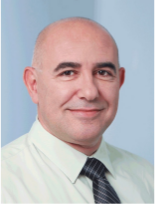
Date:
Location:
Speaker:
Abstract: As it nears its 50th year, the internal model principle, introduced by Francis and Wonham in 1976, continues to stand as a timeless cornerstone in control theory. This principle posits that a control system must incorporate specific control structures to effectively track reference inputs or counteract disturbances. Such structures function as internal models of the signals they are designed to follow or reject. Initially formulated for linear time-invariant systems, this principle has had a broad impact across many fields, most notably in the chemical process industry where its use in offset elimination has become standard practice to ensure consistent product quality. In spite of its wide use, the original principle does not apply to chemical reaction networks due to their inherently nonlinear dynamics whose evolution is confined to the positive orthant. Here we introduce an internal model principle for this important class of systems, providing simple conditions for a chemical species to track a reference input with zero offset in spite of network parameter variations. This principle is also developed for stochastic reaction networks, increasing its utility. These findings enable a deeper understanding of regulation motifs within biochemical networks. They also lay the
groundwork for engineering genetic control systems that exhibit exceptional tracking and robustness capabilities, opening new possibilities in biological engineering and cell-based therapies.
Bio: Dr. Khammash is Professor of Control Theory and Systems Biology in the Department of Biosystems Science and Engineering (D-BSSE) at ETH-Zurich. He received his B.S. degree from Texas A & M University in 1986 and his Ph.D. from Rice University in 1990, both in Electrical Engineering. In 1990, he joined the Electrical Engineering Department at Iowa State University. While at Iowa State University, he created the Dynamics and Control Program and led that control group until 2002, when he became a member of the Mechanical Engineering faculty at the University of California, Santa Barbara. In Santa Barbara, he served as Vice Chair of the Mechanical Engineering Department from 2003 to 2006 and as the Director of the Center for Control, Dynamical Systems and Computation from 2005 to 2011. In 2011 Prof. Khammash moved with his group to Switzerland, joining the Department of Biosystems Science and Engineering at ETH Zurich. At ETH Zurich he served as Vice Chair of the Department of Biosystems Science and Engineering from 2013 to 2015 and as the head of the Department of Biosystems Science and Engineering from 2015 to 2017.
Dr. Khammash works at the forefront of research in the areas of control theory, systems biology, and synthetic biology. His research aims to understand the role of dynamics, feedback, and randomness in biology, and to develop the tools needed to aid in this understanding. Work in his lab focuses on the creation of novel computational methods for the modeling, simulation, analysis, and control of biological networks, with particular attention to stochastic systems. His group has successfully applied these methods to shed new light on various biological systems. More recently, Prof. Khammash's group has been pioneering the development of the field of Cybergenetics in synthetic biology, where they
have developed new foundational theory, computational methods, and experimental tools for the real-time control of the dynamic behavior of living cells, with applications to industrial biotechnology, tissue engineering, and medical therapy.



